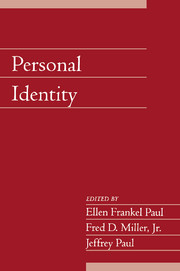Book contents
- Frontmatter
- Contents
- Introduction
- Acknowledgments
- Contributors
- Experience, Agency, and Personal Identity
- When Does a Person Begin?
- Persons, Social Agency, and Constitution
- Hylemorphic Dualism
- Personal Identity and Self-Ownership
- Self-Conception and Personal Identity: Revisiting Parfit and Lewis with an Eye on the Grip of the Unity Reaction
- The Normativity of Self-Grounded Reason
- Rationality Means Being Willing to Say You're Sorry
- Personal Identity and Postmortem Survival
- “The Thing I Am”: Personal Identity in Aquinas and Shakespeare
- Moral Status and Personal Identity: Clones, Embryos, and Future Generations
- The Identity of Identity: Moral and Legal Aspects of Technological Self-Transformation
- Index
Personal Identity and Self-Ownership
Published online by Cambridge University Press: 05 July 2014
- Frontmatter
- Contents
- Introduction
- Acknowledgments
- Contributors
- Experience, Agency, and Personal Identity
- When Does a Person Begin?
- Persons, Social Agency, and Constitution
- Hylemorphic Dualism
- Personal Identity and Self-Ownership
- Self-Conception and Personal Identity: Revisiting Parfit and Lewis with an Eye on the Grip of the Unity Reaction
- The Normativity of Self-Grounded Reason
- Rationality Means Being Willing to Say You're Sorry
- Personal Identity and Postmortem Survival
- “The Thing I Am”: Personal Identity in Aquinas and Shakespeare
- Moral Status and Personal Identity: Clones, Embryos, and Future Generations
- The Identity of Identity: Moral and Legal Aspects of Technological Self-Transformation
- Index
Summary
I. Introduction
The thesis of self-ownership is the principle on which many classical liberal and libertarian theorists, from John Locke to Robert Nozick, have founded their political philosophy. The “ownership” part of the thesis, touching as it does on the concepts of property and rights with their obvious political relevance, has understandably been the focus of debate over the principle. Still, it is curious that the other component of the thesis—the “self” that is said to be self-owned—has received so little attention from either the advocates of the thesis or its detractors. Could it be that this neglect is justified? Could it be that questions about the nature of the self are simply tangential to the question of self-ownership per se, and can safely be bracketed off by political theory and left to the metaphysicians? I want to suggest that they cannot be. The thesis of self-ownership, I want to argue, is simply not compatible with just every philosophical conception of the self on offer—and not compatible even with certain conceptions some advocates of the thesis are likely at least implicitly to be committed to when their attention is not on matters of political philosophy. Indeed, as I will try to show, the thesis may in fact be compatible with only one general approach to the metaphysics of the self.
- Type
- Chapter
- Information
- Personal Identity , pp. 100 - 125Publisher: Cambridge University PressPrint publication year: 2005

